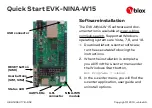
MCC
http://www.zennio.com
Technical Support:
http://support.zennio.com
19
➢
System Configuration
[
Master-Slave
2
/ Only one device
]: sets whether
the system comprises two MCCs, one operating as a master and the other
as a slave or if it consists of just one device.
When selecting the
“Master-Slave” configuration, the following parameters show up:
Master Notification Time
[
1...
4
…255
]: sets the sending period of the master
notifications, through which MCC informs (when applicable) that it is working
in the master mode.
Slave Notification Time
[
1…
10
…255
]: sets the sending period of the slave
notifications, through which MCC informs (when applicable) that it is working
in the slave mode.
Send read requests after a reboot (only for slave mode)
[
enabled
/disabled
]: enables the sending of read requests of certain objects by
the slave after a reboot so it can update its state to match that of the master.
In this case, the default communication objects are:
“
Master
”: one-bit object which is sent periodically (according to parameter
“
Master Notification Time
”) to indicate the device is operating in master
mode.
“
Slave
”: one-bit object which is sent periodically (according to parameter
“
Slave Notification Time
”) to indicate the device is operating in slave mode.
“
Role Switch
”: one-bit object which is sent (with the value ‘1’) when a role
change occurs.
“
Checksum
”: two-byte object through which the internal checksum value is
sent. The analogous value from the additional MCC is also expected to be
received through this object (to ensure their configurations match).
“
Configuration Error
”: one-bit object which is sent (periodically) with the
value
‘1’ when the master and the slave do not share the same configuration
(checksum mismatch). Once solved, it will be sent w
ith the value ‘0’.
2
The default values of each parameter will be highlighted in blue in this document, as follows:
[
default
/rest of options
].








































